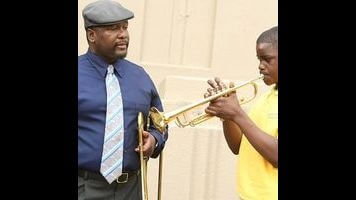Treme: "What Is New Orleans?"

George Pelecanos—a writer of terrific, D.C.-based crime fiction—wrote for all five seasons of The Wire, penning the penultimate episode to each (in addition to other episodes). These were reliably some of the series’ most memorable episodes, but also some of their most devastating. Pelecanos wrote the scripts that brought the hammer down, exploding the tension that had been slowly simmering throughout the year. Co-writing with David Simon, Pelecanos also contributed the script for the penultimate episode of Treme’s first season, an hour of collapses that saw Sonny and Annie parting ways, Janette giving up on making food in New Orleans, and Creighton enjoying his favorite parts of New Orleans, savoring the experience because he knew he would end the day by tossing himself off a ferry.
So, when Pelecanos’ name showed up a week early for the third-from-last episode I felt a mixture of excitement and dread. Then I spent the hour believing the dread might have been misplaced. This week Davis launches his album with some success—though maybe not the sort of success he wanted—Del and Albert have a recording session, Nelson makes some moves, Sofia gets some straight talk from Oliver Thomas, Ladonna comes to a difficult decision about her future, and so on. All of it feels like business as usual in another fine episode of Treme; none of it seems particularly catastrophic. Then we hit the end, as Annie and Harley get mugged and Harley suffers what looks like a fatal injury. Harley’s death has terrible implications both immediate—he’s Annie’s mentor—and symbolic. An almost-saintly figure, he’s worked as a cohesive force. Everyone, it seems, knew Harley. (Plus, it was just kind of cool to have Steve Earle on a weekly series.)
Harley’s death serves as a reminder that crime isn’t just a problem in the 2007 New Orleans of Treme’s second-season, it’s a force threatening to undo the very fabric of the town. The title of this episode, “What Is New Orleans?” reiterates a question the show’s been asking all year. Is it a place with streets run by criminals and controlled by the invisible forces of big money and corrupt back-room deals? If so, can it change? And if it doesn’t, is it still New Orleans? Creighton had an idea of what New Orleans should be. When he couldn’t see it anymore, his mind clouded by depression and professional strife in addition to the changes going on around him, he did himself in. This year, the city itself kills off a character who was no less an embodiment of New Orleans than Creighton. The place may recover from the loss and what it symbolizes, but it won’t quite be the same.
In fact, Harley’s death casts the events that preceded them in an even darker light. After all that work, Davis finds his grab for the spotlight usurped by Lil Calliope, his discovery. Turns out people don’t want a fusion of brass band and hip-hop with a Zappa-like satirical twist. Or maybe they do want it, but more people—far more people—want something they can nod their head to in their cars or get down to at the club. He’s sidelined in his moment of triumph and while his own ego may contribute to his despondency, it’s hard not to feel for the guy.
Albert and Del develop Del’s own vision of New Orleans fusion in a world-class studio with legends like Dr. John and Ron Carter in attendance. But Albert’s mixed feelings, to say the least, about the session cast a shadow on their accomplishments. Carter—and it’s the Ron Carter we’re talking about—can’t play to his satisfaction and Dr. John, who’s made it a point to be respectful to Mardi Gras Indian traditions while borrowing from them, can’t even defuse the tension with one of his trademark turns of phrase (“It’s an unpossible maneuver”). Albert is set in his Indian ways, so set that he can only see the Indian influence running one way when confronted with a similar West African costume. He’s not a dumb man. He clearly intellectually understands that Indian traditions could have their origins in Africa, but why, when he finds those traditions satisfactory in themselves and as they are, would he choose to think about them in a different light? Or, for that matter, bend them for the sake of his son’s musical vision? As we creep toward the end of the season, the sound Del’s been striving to reach all season not only seems out of reach, but the bond he’s been forging with his father is beginning to crack.
 Keep scrolling for more great stories.
Keep scrolling for more great stories.
